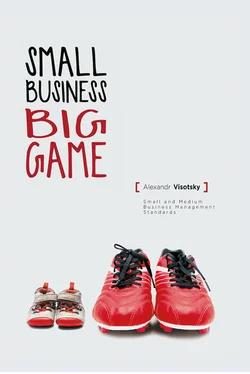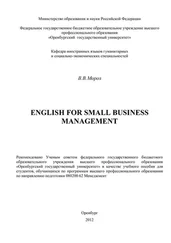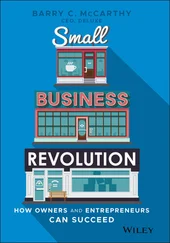Take a look at the employees of successful small companies and you will find that they work long and hard, frequently more than the employees of big corporations. At the same time, they are paid less, and they have fewer opportunities for professional advancement and a more focused area of activity. Look at this from the point of view of a capable employee who wants to achieve much in life. What are his prospects in a small business? If he is very good, he will very quickly hit the ceiling. Even if he becomes the top manager in a small company, his problems will still outnumber his triumphs. At the same time, in attempting to achieve great results in his work, he will inevitably take on more and more related areas and accumulate duties, but for most of the time he will not be doing what he dreamed of, but simply coping with chaos. You could say that a small business has one thing going for it: It may grow into a big one.
In order for a company to continue growing for a long time, it must leap many hurdles, including people-management problems. As a consultant, I interact with a large number of managers and employees, and in small business, I often meet people who are not even aware of the rules of the game that they are playing or the laws of people management. Frequently, people who are simply good specialists become managers; they do their work capably but have no idea how to organize the work of their subordinates. Most of them think that a manager’s responsibilities are giving orders, establishing incentives, and imposing penalties. Even so, they don’t even know how to handle giving orders professionally, have no idea how to issue them correctly, how to monitor performance, or how to get informative and useful feedback. I am certain that you have dealt with these types of sales department managers, people who only recently were good salespeople, are competent in working with clients, but know nothing about what to do with their subordinates. Their favorite line is “Do as I do.” They naively think that the main duty of a sales department manager is to follow his superior’s example and advice regarding sales.
I was once such a manager, naively supposing that, since our company sold computers, the main thing was sales, and that all our success depended on that. I was quite a good salesman, and all the other employees of the company observed with pleasure how I did it. Of course, applause is gratifying to a person’s self-esteem, but it is impossible to create a successful company based on a principle of “the star and the rest”; for great achievements, teamwork is necessary.
Being a star is no simple matter, and creating a truly successful company and achieving great results using such an approach will not work. Real success calls for not only professional skill in sales or knowledge of production methods; the key factor is the ability to implement operations management. This is not an incredibly difficult thing, and the principles of managing a group of people are as old as the world. But it is also true that these principles are very difficult to apply in a small company in which every person and every cent counts. In this book, you will find answers to the fundamental questions about company management and, most important, how to apply this in practice, even in a small company.
The first thing one must do is to understand what administration is. Most people are firmly convinced that administration is something unrelated to work itself, something extraneous. Administration is frequently perceived as a synonym for bureaucracy – a waste of ink and paper that only complicates work and adds nothing of value. It imposes the burden of submitting reports, participating in planning meetings, and filling out standardized report forms and documents that measure and guide the productivity and overall activity of the company. It seems to employees as well as to managers that all these reports have been imposed for the sole purpose of impeding work. And instead of simply selling or producing, people are forced to waste time filling out forms as part of reporting to management. It is not surprising that administration has such a bad reputation, and that administrators seem like bureaucrats of a sort, people who are not interested in the real business of the organization and merely shuffle papers.
Often, when a management consultant – essentially an administration specialist – comes to a company, employees do not greet him with ovations. And when a company manager tries to set up a planning system or implement regular reporting, employees perceive this as an infringement on their freedom and a questioning of their competence and productivity, so they respond to such measures with hostility. Yet everyone, for some reason, forgets the simple truth – that for a game to exist, there must be certain rules.
Try to imagine a football game with no preplanned game schedule, no score charts, no system for counting points, no rules for the coin toss, or other administrative tools. Of course the game itself does not consist of these schedules or score charts, but what would happen if all of these administrative tools in football were suddenly to disappear? The world would lose a great sport.
In any business, a technical and an administrative component can be distinguished. For example, in the work of a salesperson, the technical aspect is how he interacts with the customer, demonstrates the advantages of the product, overcomes objections, and closes the deal. But even if that salesperson is working on his own, he still needs to engage in some sort of administration – at a minimum, accurately recording his clients’ names on a notepad and adding up the amount of goods he has sold. This is obviously necessary, and if he does not keep a daily count of his sales volume, he will be unable to understand what technical actions are improving his results. He will not even be able to assess whether his work is going well or poorly. If he does not keep notes on his work with customers, then in only one month he will not be able to recall the details of his work with each of them, which sooner or later will have an impact on his sales. The work of the factory or of the purchasing department depends on the work of the salesperson, and if he does not have a plan to monitor current sales accurately and estimate future sales volume, the factory workers or buyers will not be able to plan their work, either. If a person works in a team, administration becomes an important component of a business activity, since it makes it possible to coordinate the actions of each employee with the other members of the team.
It may be an unusual idea, but only through capable administration is it possible to create an interesting and inspiring game! This sounds like a paradox, since in the minds of many, administration is something terribly boring, whereas the exciting activity of a game is entirely different- something full of emotion and enjoyment. Administration is associated with formalities, a game represents freedom and drive. So let’s take a look at this sharp distinction.
People really like playing games, and even if there is no chance of participating in a game oneself, just watching a game can bring pleasure. Nothing can compare with the interest and emotion aroused by an NFL or college championship game; cities come to a standstill during a final game, and discussions of how “our guys” played become the main topic of conversation. Sports – the Olympics, major-league baseball, professional football, college football – all enjoy lucrative media coverage and draw huge audiences in the United States, while soccer has made remarkable inroads thanks to its popularity in schools, opening America to the worldwide excitement that the game generates.
Or consider video gamers who battle virtual monsters. They move their heroes around, devise tactics, and are prepared to spend all their time on this. It is so entertaining that it is simply impossible to drag them away from the computer, and what is amusing is that victories in a computer game bring them nothing in the real world. Yet they are frequently prepared to sacrifice their real lives for the sake of the adrenaline rush that they get during a game. The game consumes all their attention, and they spend all their time on it, frequently at the expense of their health. You have surely said to yourself at some point, If only he would put as much energy into his work! And it is true: The enthusiast not only can achieve unbelievable results but he also takes pleasure in the game itself.
Читать дальше












